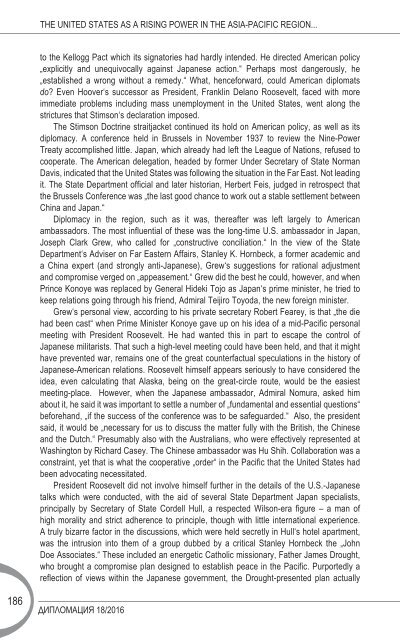DIPLOMACY ДИПЛОМАЦИЯ
2kGfdFv
2kGfdFv
You also want an ePaper? Increase the reach of your titles
YUMPU automatically turns print PDFs into web optimized ePapers that Google loves.
THE UNITED STATES AS A RISING POWER IN THE ASIA-PACIFIC REGION...<br />
to the Kellogg Pact which its signatories had hardly intended. He directed American policy<br />
“explicitly and unequivocally against Japanese action.” Perhaps most dangerously, he<br />
“established a wrong without a remedy.” What, henceforward, could American diplomats<br />
do? Even Hoover’s successor as President, Franklin Delano Roosevelt, faced with more<br />
immediate problems including mass unemployment in the United States, went along the<br />
strictures that Stimson’s declaration imposed.<br />
The Stimson Doctrine straitjacket continued its hold on American policy, as well as its<br />
diplomacy. A conference held in Brussels in November 1937 to review the Nine-Power<br />
Treaty accomplished little. Japan, which already had left the League of Nations, refused to<br />
cooperate. The American delegation, headed by former Under Secretary of State Norman<br />
Davis, indicated that the United States was following the situation in the Far East. Not leading<br />
it. The State Department official and later historian, Herbert Feis, judged in retrospect that<br />
the Brussels Conference was “the last good chance to work out a stable settlement between<br />
China and Japan.”<br />
Diplomacy in the region, such as it was, thereafter was left largely to American<br />
ambassadors. The most influential of these was the long-time U.S. ambassador in Japan,<br />
Joseph Clark Grew, who called for “constructive conciliation.” In the view of the State<br />
Department’s Adviser on Far Eastern Affairs, Stanley K. Hornbeck, a former academic and<br />
a China expert (and strongly anti-Japanese), Grew’s suggestions for rational adjustment<br />
and compromise verged on “appeasement.” Grew did the best he could, however, and when<br />
Prince Konoye was replaced by General Hideki Tojo as Japan’s prime minister, he tried to<br />
keep relations going through his friend, Admiral Teijiro Toyoda, the new foreign minister.<br />
Grew’s personal view, according to his private secretary Robert Fearey, is that “the die<br />
had been cast” when Prime Minister Konoye gave up on his idea of a mid-Pacific personal<br />
meeting with President Roosevelt. He had wanted this in part to escape the control of<br />
Japanese militarists. That such a high-level meeting could have been held, and that it might<br />
have prevented war, remains one of the great counterfactual speculations in the history of<br />
Japanese-American relations. Roosevelt himself appears seriously to have considered the<br />
idea, even calculating that Alaska, being on the great-circle route, would be the easiest<br />
meeting-place. However, when the Japanese ambassador, Admiral Nomura, asked him<br />
about it, he said it was important to settle a number of “fundamental and essential questions”<br />
beforehand, “if the success of the conference was to be safeguarded.” Also, the president<br />
said, it would be “necessary for us to discuss the matter fully with the British, the Chinese<br />
and the Dutch.” Presumably also with the Australians, who were effectively represented at<br />
Washington by Richard Casey. The Chinese ambassador was Hu Shih. Collaboration was a<br />
constraint, yet that is what the cooperative “order” in the Pacific that the United States had<br />
been advocating necessitated.<br />
President Roosevelt did not involve himself further in the details of the U.S.-Japanese<br />
talks which were conducted, with the aid of several State Department Japan specialists,<br />
principally by Secretary of State Cordell Hull, a respected Wilson-era figure – a man of<br />
high morality and strict adherence to principle, though with little international experience.<br />
A truly bizarre factor in the discussions, which were held secretly in Hull’s hotel apartment,<br />
was the intrusion into them of a group dubbed by a critical Stanley Hornbeck the “John<br />
Doe Associates.” These included an energetic Catholic missionary, Father James Drought,<br />
who brought a compromise plan designed to establish peace in the Pacific. Purportedly a<br />
reflection of views within the Japanese government, the Drought-presented plan actually<br />
186<br />
<strong>ДИПЛОМАЦИЯ</strong> 18/2016


